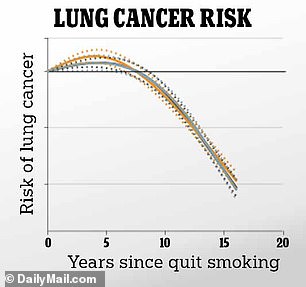Quitting smoking before the age of 50 reduces the risk of lung cancer by 57% compared to quitting later in life, according to research among 3 million people
Research shows that quitting smoking before the age of 50 has a greater chance of preventing lung cancer than quitting after 50.
Researchers from Korea studied more than 2.9 million people and found that people who quit smoking had a 17 percent lower risk of all types of cancer compared to those who did not quit smoking.
Smoking is known to contribute to multiple cancers, including lung, stomach, colorectal, liver, pancreatic and kidney cancers.
Cigarettes increase the risk of cancer because toxins in cigarette smoke can weaken the body’s immune system, making it more difficult to kill cancer cells.
Smoking is known to contribute to multiple cancers, including lung, stomach, colorectal, liver, pancreatic and kidney cancers.
The researchers looked at Koreans aged 30 and older who underwent two or more consecutive health checkups with the National Health Insurance Service in 2002 and were followed until 2019.
They checked whether participants had developed cancer using cancer registry data.
Of the 2.97 million participants, there was a mean follow-up of 13.4 years, during which time 197,000 cases of cancer were confirmed.

About seven years after quitting smoking, the researchers saw an increase in cancer risk. This may be because these individuals had already accumulated significant damage as a result of smoking, also known as ‘sick quitters’.
About seven years after quitting smoking, the researchers saw an increase in cancer risk.
This may be because these individuals had already accumulated significant damage as a result of smoking, also known as ‘sick quitters’.
This means that they did not become ill by quitting smoking, but quit smoking because they became ill.
Compared to those who did not quit smoking, people who quit completely had a 17 percent lower risk of cancer.
The participants’ risk of cancer remained elevated ten years after quitting, but after fifteen years or more the risk was halved.
The risk of lung cancer was the first to fall, falling three years earlier than other types of cancer.
Quitting before age 50 was associated with a 57 percent reduction in lung cancer risk compared to quitting at age 50 or older.
Quitting smoking resulted in a risk reduction of 42 percent for lung cancer, 27 percent for liver, 14 percent for stomach and 20 percent for colon cancer, compared to continuing to smoke.
The research was published in the journal JAMA network opened.
Lung cancer is the leading cause of cancer deaths in the US. It is responsible for one in five cancer deaths, followed by colorectal cancer, which causes one in ten cancer deaths.
About 238,000 new cases of lung cancer are diagnosed in the U.S. each year — and 127,000 people die from the disease, according to the American Cancer Society.
There are two main types of lung cancer: small cell and non-small cell.
Non-small cell lung cancer is the most common type, responsible for nine out of 10 lung cancer diagnoses, and tends to grow more slowly. It usually does not cause symptoms until it has progressed.
According to the NCI, signs of non-small cell lung cancer include chest pain or discomfort, a persistent cough, difficulty breathing, wheezing, coughing up blood, loss of appetite, unintentional weight loss, fatigue or lethargy, difficulty swallowing and swelling. on the face or veins in the neck.
Cigarette smoking is the leading cause of lung cancer.
In 2021, an estimated 11.5 percent of U.S. adults smoked cigarettes, representing 28.3 million people.
According to the charity Cancer Research, smoking releases more than 5,000 different chemicals.
These harmful chemicals enter the lungs and damage DNA.
DNA is responsible for how our cells grow and behave. Damage to DNA causes cells to behave in a way that is not intended. A buildup of DNA damage over time can lead to cancer.
Other chemicals make it harder for cells to repair DNA damage, which can cause cancer.
A 2004 study, which was a follow-up to a 50-year study of British doctors, found that if smokers quit before the age of 30, they can avoid more than 90 percent of the risks of lung cancer caused by smoking.
Smoking also has an effect on other forms of cancer. Experts believe that smoking causes at least 15 types of cancer.
It can be the cause of mouth and throat cancer, rectal, liver and pancreatic cancer, to name a few.
